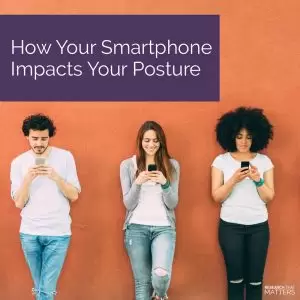BOTTOM LINE:
Believe it or not, many of us spend 3 hours or more per day on our smartphones. That adds up to over 1,000 hours each year!
And the positions we tend to hold our heads in while using our devices can be, well… damaging. Damaging to your posture and damaging to your spine.
It’s not surprising that over the past few years, an uptick in these awkward positions has led to an uptick in head and neck pain.
WHY IT MATTERS:
It’s estimated that tilting your head forward, even just 15 degrees, can triple the weight of your head on your neck. In fact, tilting your head forward 60 degrees can increase the stress and strain on your neck ten times over.
Repeating this forward head posture again and again over time can result in pain, stiffness, dysfunction, headaches, and more – a group of symptoms often referred to as “Tech Neck.”
The good news about postural stress and “Tech Neck” is that a few simple changes to your routine can help you reduce your risk of experiencing pain.
Here’s what you need to know:
“Tech Neck” is the term used to describe the flexed head and neck position that occurs when looking down at your smartphone.
Just 15 degrees of forward bending can increase the stress of your head on your neck three times over.
Taking breaks every 15 minutes and looking up from your phone or tablet can help your body reset and give your muscles a chance to relax.
NEXT STEPS:
Know that reducing your “Tech Neck” symptoms involves more than just changing the angle you look at your phone.
Proper ergonomics and regular stretching and exercise all play significant roles in helping you continue to enjoy your favorite devices without those nagging pains.
If you’ve been living with “Tech Neck” and are ready to take action, you’ve come to the right place!
Our expert team is ready to not only help evaluate your ergonomics but to also provide a plan of action complete with personalized recommendations that will help make it easy for you to maintain a more balanced posture for years to come.
SCIENCE SOURCE(S):
“Tech Neck” Taking a Toll on Posture. Columbia Spine. 2018.





